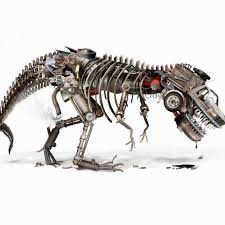
I came across a belief that dinosaurs are the content of fossil fuels. I assume this is a primary school issue, connecting dinosaurs and fossils—how we know about the dinosaurs—with the use of fossil as a adjective. What I write here is the content stripped of all the humorous content. Indeed, I was so gobsmacked I didn't even see it as funny until quite some time later and only after I'd seen how much has been written trying to undo the confusion. How do we reach such conclusions? In this case because the single word fossil as noun is connected to the use of the adjective; this is correct. Where the logical failure lies is that we learn(ed) at early school that we know about dinosaurs because of the fossil records but that does not mean that all fossils are of dinosaurs. Powells.com essay. A house assembly topic to have fun with.
I move from there to wonder what the relative loss of plant life is over animal (and what other life amounts to significant mass). The division of life is itself quite interesting; Plantae, animalia, protista versus regnum lapideum (minerals). Then we separated life so that the previous three were deemed Eukaryota and added at the same level Prokaryota, which is / are bacteria. Where then does one place the fungi? This became a fourth kingdom within the domain of eukaryota. The expansion to six kingdoms came by dividing the prokaryota into bacteria and something older, so we add Eubacteria and Archaebacteria. By 2015 we'd moved the totals up and down again and now the consensus is as shown to the right, taken from wikipedia. The analysis of life under these headings by mass can be found here. Except that this is gigatonnes of carbon. Fair enough, it at least is a measure and it is available.
What is a fossil?
Fossils are formed in different ways, but most are formed when a plant or animal dies in a watery environment and is buried in mud and silt. Soft tissues quickly decompose leaving the hard bones or shells behind. Over time sediment builds over the top and hardens into rock.
The Oxford English Dictionary notes that in the phrase "fossil fuel" the adjective "fossil" means "[o]btained by digging; found buried in the earth", which dates to at least 1652, before the English noun "fossil" came to refer primarily to long-dead organisms in the early 18th century. [wikipedia]
Taking this as the available data, we have 550 GtC on the planet, of which 450 GtC is plants and around 2 GtC is animals, though the authors of that site are keen for us to understand it was probably a lot bigger back in the dinosaurs' day, but they think two times as much rather than my instinctive ten times. Whatever, plants make up something like 80% of all the life and probably did so back in the times of the dinosaurs. Dinosaurs are included in fossil fuels, but far less than a single percent of the whole. Most of fossil fuel comes from the small stuff like plankton. The suspicion is that there is a lot less life in total now than there was, thanks to humans. So when the likes of David Attenborough says we need to grow up and act or lose the lot, that is not merely a soundbite.
_____________________